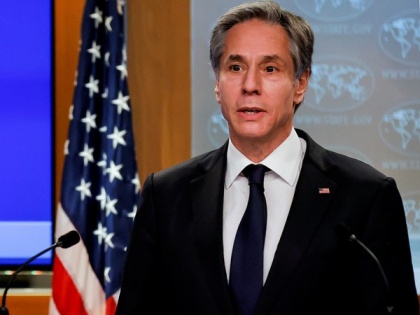Blinken defends Trump administration moves against Chinese media outlets in US 'for undermining democracy'
By ANI | Published: April 29, 2021 01:58 PM2021-04-29T13:58:32+5:302021-04-29T14:05:02+5:30
US Secretary of State Antony Blinken on Wednesday defended the measures taken by his predecessor Mike Pompeo against the Chinese media outlets operating in the United States for "undermining democracy".

Blinken defends Trump administration moves against Chinese media outlets in US 'for undermining democracy'
US Secretary of State Antony Blinken on Wednesday defended the measures taken by his predecessor Mike Pompeo against the Chinese media outlets operating in the United States for "undermining democracy".
According to South China Morning Post, the US and China began restricting and expelling each other's journalists in February 2020, when the State Department declared several mainland Chinese media outlets, including state news agency Xinhua and the state-run English-language newspaper China Daily, to be foreign government functionaries controlled by Beijing.
The move has required the media outlets' staff members to register with the US government the same way that embassy and consular employees do.
Blinken said that the department was "making sure we're promoting transparency, not interfering with the media outlets and their ability to report on topics that they choose no matter how critical they happen to be of the United States government".
"We didn't ban these state-controlled media outlets, which continue to operate here, but we wanted to make sure that there was transparency and that people had full knowledge that what they were reading was, in effect, produced at the behest of the government in Beijing," Blinken said as quoted by SCMP.
"The real concern here is Beijing's use of propaganda and disinformation overseas, through state-owned media enterprises and platforms, with the purpose, in part, of interfering or undermining democracy, while restricting freedom of the press and speech in China," he added. "It's very hard to say, 'Oh, they can have it both ways'."
The Chinese foreign ministry retaliated by revoking the press credentials of American journalists from three newspapers - The New York Times, The Wall Street Journal and The Washington Post - essentially expelling them from the country, as reported by South China Morning Post.
Beijing also designated those three media outlets along with Voice of America and Time magazine - as foreign government functionaries, identifying them as agencies controlled by Washington.
After China expelled the American journalists, the US Department of Homeland Security tightened visa rules for journalists holding mainland Chinese passports, limiting their visas to 90 days with the option to extend. Journalists with passports from Hong Kong or Macau are not affected.
This comes as, under the former President Donald Trump's administration, ties between the two countries had deteriorated over issues such as human rights violations in Xinjiang, encroachment on the special status of Hong Kong, accusations of unfair trade practices by Beijing, lack of transparency concerning the pandemic and China's military aggression in various parts of the world.
China continues to take internet censorship, surveillance and propaganda to unprecedented levels making it one of the world's worst countries for journalists and the 'biggest jailer' of scribes, according to a latest report by Reporters Without Borders (RSF).
( With inputs from ANI )
Disclaimer: This post has been auto-published from an agency feed without any modifications to the text and has not been reviewed by an editor
Open in app